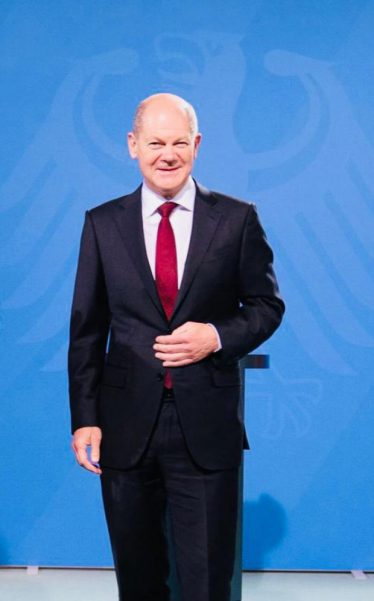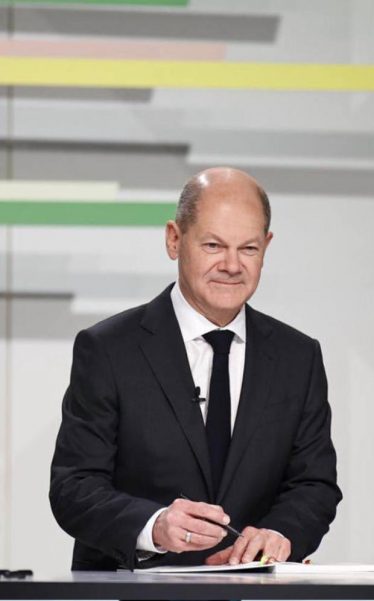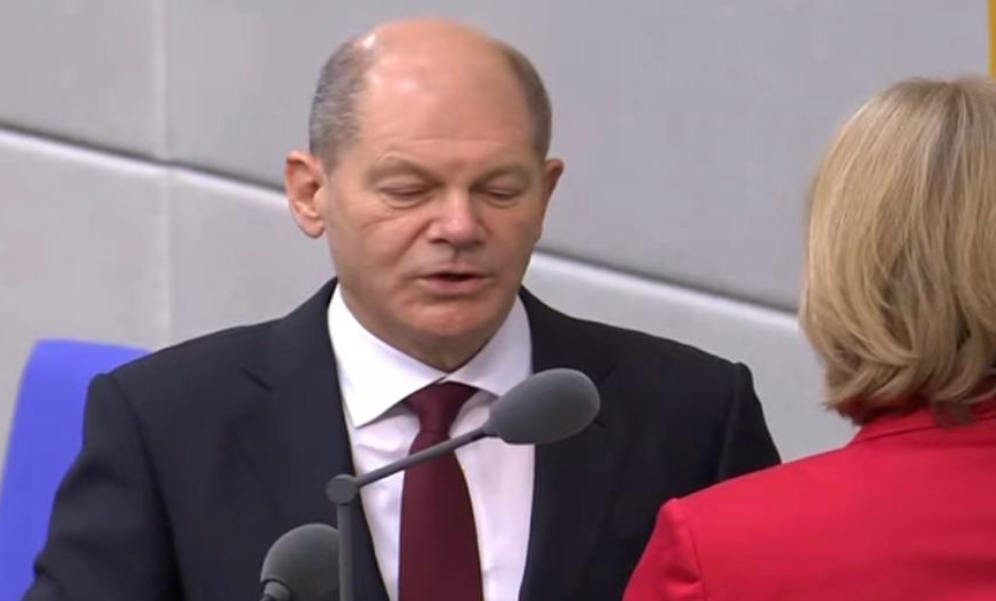After Angela Merkel decided that she would not run for a fifth term, changes began to take place in the German political scene.
Let’s start by saying that Angela Merkel has been a symbol of stability in Europe since she took office in 2005.
That was a total of 5,860 days of Merkel as chancellor and 16 years of a center-right government. Now, Olaf Scholz is the new Chancellor and took over the leadership of one of the world’s leading economic powers on December 8, 2021.
And with that change also came questions: What will Scholz’s style of government be? What can Germany’s allies expect from the new chancellor?
A little about him
The new German chancellor is a member of the Social Democratic Party. Olaf Scholz is an experienced politician and a convinced Social Democrat. He is considered reserved and a bit boring. He is seen as a guarantee of stability and moderation.

His wife is Britta Ernst and is also a member of the Social Democratic Party. Scholz grew up in Hamburg and entered politics as a leader of the Socialist Youth, after studying labor law.
He was mayor of Hamburg from 2011 to 2018 and was first elected to the Bundestag in 1998.
Since 2018 he has served as Vice-Chancellor and Minister of Finance in Merkel’s coalition government.
He had pragmatic handling of the covid-19 crisis and this earned him much praise and high approval ratings.
As finance minister, Olaf Scholz oversaw the emergency funding package of 750 billion euros, which is equivalent to US$884 billion that was put together by the federal government to help German businesses and workers survive the pandemic.
The new government
During the election campaign, he made it clear at all times that he would insist on strict rules on European policy, and at the meeting of the European Union’s economy and finance ministers in September he refused to relax the Stability Pact, which earned him a hard clash with France and Spain, who demanded more flexibility.
The parties that will form Germany’s new government signed their coalition agreement, making official the formation of the so-called “traffic light” (due to the colors of each party).
The leaders of the Social Democratic Party (SPD), the Greens, and the Free Democratic Party (FDP) sealed the agreement after the liberals and social democrats approved the agreement in their respective congresses.
The leader of the Greens, Robert Habeck, promised “a government for the people of Germany”. The leader stressed that the challenge for the world’s fourth-largest economy will be to reconcile climate neutrality with prosperity.
The 177-page government program is entitled “Dare to make more progress”, and the aim of the parties is for Germany to make a leap forward in various aspects.
That is, if Scholz and his coalition succeed in delivering on the plans laid out in the coalition agreement document, the result will be the most progressive version of Germany in a generation.
Some of the changes
The first thing that reshuffles is the Green Party’s approach.
The new government expects the country to reach carbon neutrality by 2045. Also, solar energy will be mandatory on the roofs of commercial buildings and new private homes.

A number of changes have also been proposed that would improve the living conditions of Germans.
The minimum wage is to be increased to 12 euros per hour to address the crisis in the labor market.
In Germany, low-paid jobs have increased, as well as temporary contract jobs, so there are more than seven million Germans who are not contributing to the pension system.
Rent prices have skyrocketed and for cities like Berlin, where more than 80 % live in rented accommodation, this is a big problem.
It has been shown that there is a national building shortage, so Scholz’s coalition wants to build 400,000 new apartments per year, a quarter of which will be social housing.
On the international front, Olaf Scholz and his new foreign minister, Annalena Baerbock of the Greens, will have to deal with a crisis from the outset.
Referring to Russian troop movements and U.S. warnings against an invasion of Ukraine, they have made it clear that a “new understanding” is required that borders cannot be changed in Europe.
Against that backdrop, the issue of the Nord Stream 2 pipeline, which would bring Russian gas to Western Europe without passing through Ukraine, could become a litmus test for the German coalition government.
Radical proposals
On the other hand, the new German government wants to strengthen the powers of the European Parliament and intends to take more vigorous action against violations of the rule of law in EU countries such as Poland and Hungary.
In Chapter 7 of the coalition agreement, entitled “Germany’s Responsibility in Europe and the World”, the document argues that the EU must have a greater capacity for action at the international level and act more united.
Social Democrats, Greens, and Liberals underlined their support for the democracy movement and Ukraine in their coalition agreement. The idea is to achieve a balanced policy between economic interests and the protection of human rights against the background of system rivalry.
An important point is that German citizenship can be obtained after five years of residence, or even after three years in the case of special integration merits. Children of foreigners born in Germany will obtain citizenship if at least one of their parents has lived in the country for five years.
The coalition also intends to reduce “irregular immigration”, speed up asylum procedures, and digitalize the issuing of visas.
The most progressive change refers to the full legalization of marijuana in its governing document.
This would make Germany the first country in Europe to seek full legalization of cannabis, the third nation to adopt this measure after Uruguay and Canada.
Women and the LGBTI Community
Another important change comes in the area of women’s rights.
The international community has been criticizing this law for decades, which they see as an obstacle for women seeking to make informed decisions.
The coalition plans to remove the ban on doctors from providing information about abortion by repealing Section 219 of Germany’s Criminal Code, which prohibits “abortion advertising.”
Technically, abortion is completely illegal in Germany. However, under certain circumstances, it is permitted and the procedure must be performed no more than 12 weeks after conception.
As a result of the law prohibiting the dissemination of information by medical personnel. This leads to women finding it too difficult to know what procedures they can undergo and who can perform them.
Until 2019, doctors could not publicly declare that they could perform abortions.
It is worth noting that at the moment, Germany is the third European country with the lowest abortion rate; statistics show that only 5.8 out of every 1,000 German women between the ages of 15 and 49 undergo abortion procedures, a merit of its strict pro-life laws.
Finally, there are a number of policies that have a positive impact on the LGBTI community.
Let’s start by saying that the number of crimes against lesbian, gay, bisexual, transgender, and intersex people in Germany is high, the number of unreported cases is probably even higher.
For members of the LGBTI community, it will be a little easier to change the sex of people, end of the ban on blood donation for homosexuals and transgender people, and the criminalization of attacks against this community as “hate crimes”.
The pandemic
While all these changes or plans for them are really important, the most urgent thing at the moment is to combat the pandemic, which has already claimed more than 100,000 lives in Germany.
The truth is that the number of infections has risen to disturbing heights and has already passed the 100,000 dead mark days ago. The vaccination rate is still below what was expected, and the new Minister of Health, Karl Lauterbach, speaks of Germany’s worst health crisis since World War II.
In the new government, a crisis committee has been set up to take over the central tasks of the fight against the pandemic in the Chancellery.
Its tasks will be to coordinate and support the conduct of the vaccination campaign and to strengthen the dispatch and distribution of vaccines. The multidisciplinary team is headed by General Carsten Breuer, a military officer considered to be a logistics expert with extensive experience in crisis management.
Paperwork and Culture
Although it may seem impossible, the coalition aims to reduce bureaucracy and prepare Germany for the digital future. And it wants to start with the administrative apparatus, aiming for digitalization and greater transparency. The aim is to promote participation and speed up authorization processes, especially in the case of infrastructure projects.
It also plans, in another section, to increase the digitalization of schools.

At the height of the fourth wave of the coronavirus, the wishes of the German cultural sector are making themselves felt. The German film industry, for example, is hoping for further support. Already in the middle of last year, the government headed by Angela Merkel at the time drew up a program to support the cultural sector in the face of the pandemic.
In the field of literature, there are already support systems in place, including numerous literary prizes. But the situation is different in the theater, which is mainly the responsibility of the federal states. However, many theaters have been able to take advantage of the support provided to overcome the COVID-19 crisis, and it is expected that this will be maintained in accordance with the new government’s coalition agreement.
Concluding
The secret of the Germans’ success is not only in their smooth and exemplary transition of power to show stability, but that their parties understand that there is always something they can work on together to improve people’s living conditions.
This traffic light government has many interesting proposals. We have to wait to see how all these ideas and plans will be developed. We have to wait to see if they were more than just phrases to be able to win the elections. It is still too early to know how the post-Merkel era will develop. We remain hopeful for a better future for Germany and for everyone.


